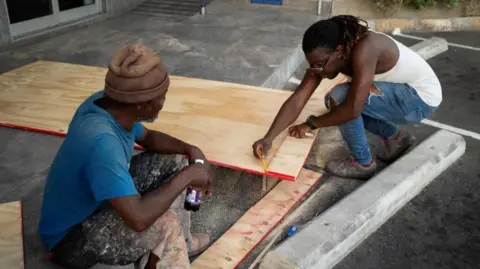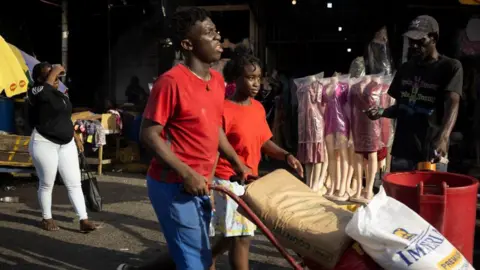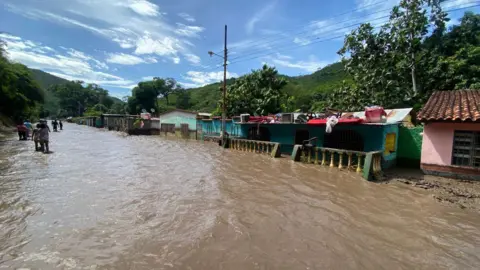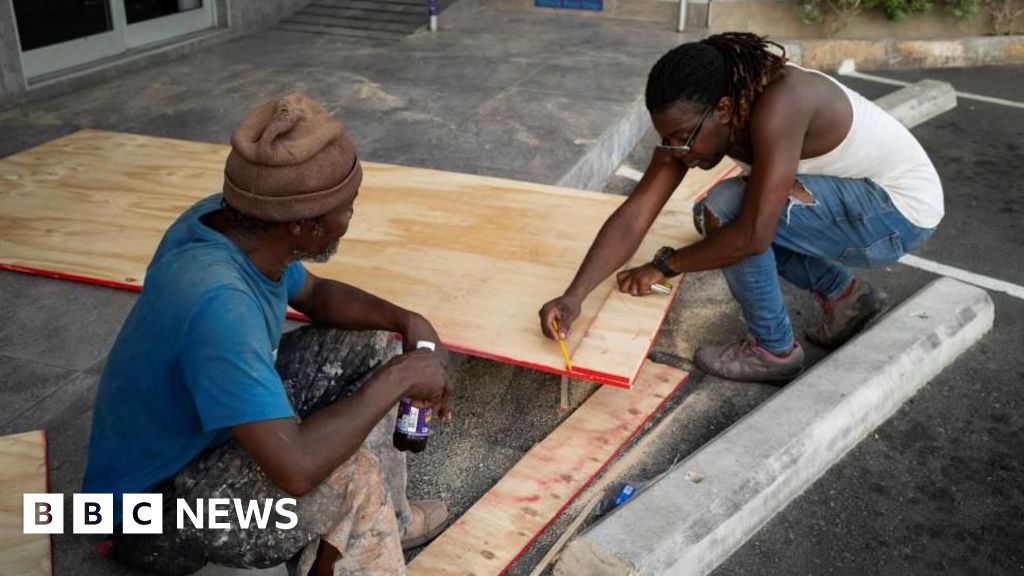By Vanessa Buschschlüter, BBC News
 Reuters
ReutersJamaicans are bracing for the impact of a deadly hurricane which looks set to hit the Caribbean island later on Wednesday.
Hurricane Beryl is expected to bring “life-threatening winds and storm surge” to Jamaica and the Cayman Islands, the US National Hurricane Center (NHC) warns.
Jamaican authorities have imposed an island-wide curfew from 06:00 to 18:00 local time (12:00-00:00 BST).
Prime Minister Andrew Holness urged people to “take this hurricane seriously”.
“If you live in a low-lying area, an area historically prone to flooding and landslide, or if you live on the banks of a river or a gulley, I implore you to evacuate to a shelter or to safer ground,” he said.
At least seven people are reported to have died as a result of the storm as it swept through the Caribbean.
Three people died in Grenada, where it first made landfall on Monday, one in St Vincent and the Grenadines, and another three in northern Venezuela, which was hit by strong winds and flooding.
One of the islands worst affected was Union Island – part of St Vincent and the Grenadines – where 90% of homes were destroyed or severely damaged.
While Hurricane Beryl has slightly diminished in strength from a category five to a category four storm, it still had maximum sustained winds of 145mph (230km/h), according to a NHC alert issued early on Wednesday morning.
The BBC’s Nick Davis said Jamaicans had been rushing to supermarkets on Tuesday to get “as much as they could as quickly as they could” to prepare themselves and their homes for the potential devastation Beryl could cause.
“It’s all about protecting life, that’s first and foremost, but when storms blow through, property and people’s livelihoods get destroyed in the course of a few hours, that’s what scares people, that’s what worries people,” our correspondent said.
 Reuters
ReutersThe director of the US National Hurricane Centre (NHC), Dr Michael Brennan said there could be “devastating to catastrophic wind damage” with “widespread damage to homes, roofs, trees, power lines [and] infrastructure”.
Dr Brennan also said that there could be a storm surge of five to eight ft (1.5-2.4m) above tide level along the coast of Jamaica and “potentially devastating wave action” which he warned could lead to life-threating situations.
Jamaica’s information minister, Dana Morris Dixon, said there was plenty of space in shelters for those who may have to evacuate.
“We have over 900 shelters that have been listed, so individuals who may need to move from their homes in the event of the impact of the wind or the rain, they will be able to go to government shelters right across the island,” she said.
 Getty Images
Getty ImagesIn Venezuela, Hurricane Beryl brought heavy rains which caused a river to overflow in the northern state of Sucre.
Three people died and several are still missing.
A government delegation was hit by a falling tree while inspecting the storm damage.
President Nicolás Maduro said Vice-President Delcy Rodríguez, was among those injured.
He said she was “very bruised but conscious”.
The NHC said that Hurricane Beryl was the earliest category five storm in the Atlantic that they had ever recorded, and had formed much earlier in the hurricane season than usual.
Meteorologists have also remarked on how quickly Beryl developed.
The storm strengthened from a tropical depression into a major hurricane – category three or above – in only 42 hours, hurricane expert Sam Lillo told Associated Press news agency.
The US National Oceanic and Atmospheric Administration (NOAA) has warned that the North Atlantic could get as many as seven major hurricanes this year – up from an average of three in a season.


